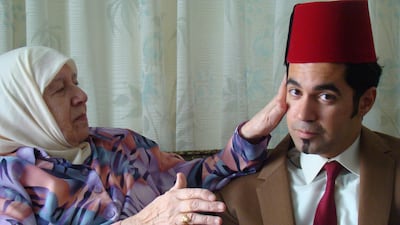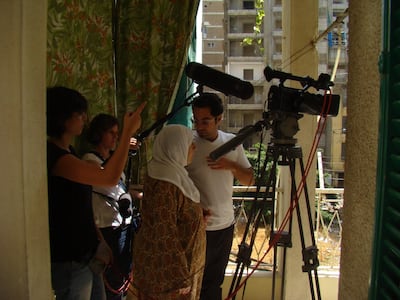My grandma Fatima, or Teta Fatima, just died for the second time. She was 93. This will be the final time she leaves us.
When we collaborated a decade ago on Grandma, a Thousand Times, a film about her life, she and I mitigated the idea of her death in every scene. Teta Fatima lived her lonesome daily life in front of my camera while I, as a filmmaker, immersed myself in my fear of losing her.
In the process, heritage was brought to life and is captured on film for posterity. In her signature Beiruti accent, as she made traditional dishes and interacted with a distant world from her balcony, Teta often spoke of how she longed to join her deceased husband. Making this film together tempered my lifelong fear of death, which I realised the day she was laid in the ground.
Fatima El Ghoul was only a few years younger than the troubled Lebanese Republic. She raised six children through various wars, food shortages and the financial uncertainty of her sickly husband’s musical career.
Her illiteracy would become a source of great inventiveness. She created a system of dashes and strokes to record phone numbers, and colour codes to identify her many medicines. She was entirely spared the toxicity of the internet. Her verbal skills naturally came to the fore. Teta could lament, gossip or chide, and always held court.
Her addiction to smoking hookah resulted in her having a pipe within reach at all times. Her religious veil did not obstruct her love of cursing, or her ease at interacting with men. As was common in those days, she was strongly preferential of male progeny who would carry the family’s name; a value I needed to move away from as I became the proud father of two girls. But her love for me is undoubtedly what made my film possible.
On screen, Teta managed to slow the passage of time. Her storytelling was so gently paced that one could simultaneously follow the sound of a vegetable vendor as he pushed his cart past her window. People saw in her a rare protagonist: devout, empowered, illiterate and surly. The nuances of Sunni Beirut culture that she put forth in her story had remained largely uncelebrated.
She had not been on a plane in 20 years when she accepted my invitation to attend the world premiere of the film. There, she walked the red carpet and finger-printed posters for adoring fans. She also set off the fire alarm as she tried to light hookah charcoal in her hotel room.
I visited her more than once as Grandma, a Thousand Times toured the film circuit. To hear that she brought people to tears in Japan and Argentina stoked her vanity. "We should make another," she'd say.
While making the film, I initially wanted to shoot with Teta Fatima until the day she passed away. I wanted to observe her home transforming after she vanished, and see how family ties changed without her at the helm. My father laughed at the prospect. “She will likely outlive you!” he said. But I still saw her death as the most dramatic device with which I could finish my portrait of her. So I shamelessly suggested that we should stage her funeral. She readily obliged, but cousins and uncles were quite reluctant.
The fear of her passing, it turns out, was a family taboo and this was a charged opportunity to face it. On the last day of filming, we hid peeled onions in various parts of her room to help our tears trickle, and stood around her supposed deathbed where she lay still. I asked her to keep her eyes closed and rolled the camera.
Suddenly, family members began sobbing for real at this glimpse of what her death might look like. The camera kept rolling until she opened her eyes and asked: “Was it good enough?”
I made sure that the film included both the trick and its reveal. The scene would come to define the film. The old lady looked death in the eye and laughed.
Teta passed away in her home in a setting that fulfils the film. For 12 hours, she was surrounded by children and grandchildren, who saw her through as she joined her musician sweetheart again. Her home had already begun transforming. A hydraulic hospital bed was brought in and the kitchen was long out of use. Beirut was only recently devastated by a massive explosion.
Now, a generation of feisty matriarchs is no more.



